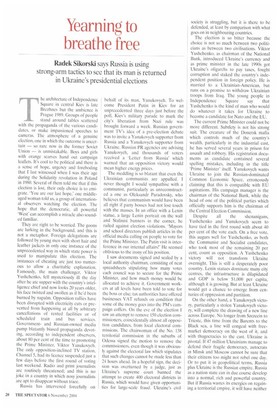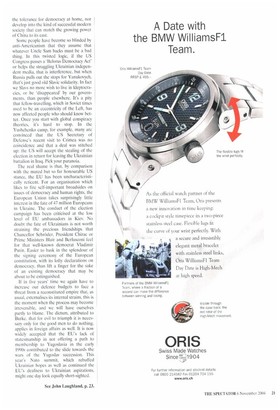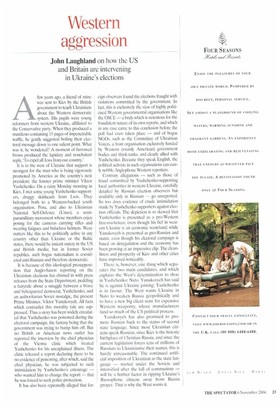Yearning to breathe free
Radek Sikorski says Russia is using strong-arm tactics to see that its man is returned in Ukraine's presidential elections
The architecture of Independence Square in central Kiev is late Brezhnev but the ambience is Prague 1989. Groups of people stand around tables scattered with the propaganda of the various candidates, or make impassioned speeches to cameras. The atmosphere of a genuine election, one in which the outcome is uncertain — so rare now in the former Soviet Union — is unmistakable. Boys and girls with orange scarves hand out campaign leaflets. It's cool to be political and there is a sense of hope, urgency and foreboding that I last witnessed when I was their age during the Solidarity revolution in Poland in 1980. Several of them told me that if this election is lost, their only choice is to emigrate. 'You are our last hope,' one middleaged woman told us, a group of international observers watching the election. The hope that the democratic, all powerful 'West' can accomplish a miracle also sounded familiar.
They are right to be worried. The goons arc lurking in the background, and this is not a metaphor. Foreign delegations arc followed by young men with short hair and leather jackets in only one instance of the unprecedented way in which state power is used to manipulate this election. The instances of cheating are just too numerous to allow a charitable explanation. Famously, the main challenger, Viktor Yushchenko, fell mysteriously ill the day after he ate supper with the country's intelligence chief and now looks 20 years older, his face twisted and swollen as if he'd been burned by napalm. Opposition rallies have been disrupted with electricity cuts or prevented from happening at all by arbitrary cancellations of rented facilities or of scheduled train and bus services. Governmentand Russian-owned media pump blatantly biased propaganda devoting, according to independent observers, about 80 per cent of the time to promoting the Prime Minister, Viktor Yanukovych. The only opposition-inclined TV station, Channel 5, had its licence suspended just a few days before the first round of voting last weekend. Radio and print journalists are routinely threatened; and this is no joke in a country in which nosy journalists are apt to disappear without trace.
Russia has intervened forcefully on behalf of its man, Yanukovych. To welcome President Putin in Kiev for an unprecedented three days just before the poll, Kiev's military parade to mark the city's liberation from Nazi rule was brought forward a week. Russian government TV's idea of a pre-election debate was to invite a Yanukovych supporter from Russia and a Yanukovych supporter from Ukraine. Russian PR agencies are advising Yanukovych, and thousands of voters received a 'Letter from Russia' which warned that an opposition victory would mean higher energy prices.
The meddling is so blatant that even the Ukrainian communists are appalled. never thought I would sympathise with a communist, particularly as unreconstructed a one as Oleksandr Paradovsky, who believes that communism would have been all right if party bosses had not lost touch with the masses. In an office with a Lenin statue, a large Lenin portrait on the wall and Stalinist banners in the corner, he railed against election violations. 'Mayors and school directors publish articles in the official media calling on people to vote for the Prime Minister. The Putin visit is interference in our internal affairs!' He seemed oblivious to the irony of his position.
I saw documents signed and sealed by a local authority chairman, consisting of neat spreadsheets stipulating how many votes each council was to secure for the Prime Minister, and how much money would be allocated to achieve it. Government workers at all levels have been told to vote for the boss or else; tax authorities have offered businesses VAT refunds on condition that some of the money goes into the PM's campaign coffers. On the eve of the election 1 saw an attempt to remove 150 election commissioners, coincidentally almost all opposition candidates, from local electoral commissions. The chairwoman of the No. 138 territorial commission in the suburbs of Odessa signed the motion to remove the commissioners, even though it was obviously against the electoral law which stipulates that such changes cannot be made less than 24 hours ahead. In a hopeful sign, the decision was overturned by a judge, just as Ukraine's supreme court banned the attempt to create 400 electoral districts in Russia, which would have given opportunities for large-scale fraud. Ukraine's civil
society is struggling, but it is there to be defended, at least by comparison with what goes on in neighbouring countries.
The election is so bitter because the choice is not so much between two politicians as between two civilisations. Viktor Yushchenko, as chairman of the National Bank, introduced Ukraine's currency and as prime minister in the late 1990s got Ukraine's oligarchs to pay taxes, fought corruption and staked the country's independent position in foreign policy. He is married to a Ukrainian-American, but runs on a promise to withdraw Ukrainian troops from Iraq. The young people in Independence Square say that Yushchenko is the kind of man who would do whatever it takes for Ukraine to become a candidate for Nato and the EU.
The current Prime Minister could not be more different. Subtlety is not his strong suit. The creature of the Donetsk mafia which controls much of the country's wealth, particularly in the industrial east, he has served several years in prison for assault and robbery. His registration documents as candidate contained several spelling mistakes, including in the title 'Prime Minister' itself. Yanukovych wants Ukraine to join the Russian-dominated Common Economic Space, erroneously claiming that this is compatible with EU aspirations. His campaign manager is the chairman of the National Bank, while the head of one of the political parties which officially supports him is the chairman of the Central Election Commission.
Despite all the shenanigans, Yushchenko and Yanukovych seem to have tied in the first round with about 40 per cent of the vote each. On a free vote, this augurs well for Yushchenko, as both the Communist and Socialist candidates, who took most of the remaining 20 per cent, count as opposition. A Yushchenko victory will not transform Ukraine overnight. This is still a desperately poor country. Lenin statues dominate many city centres, the infrastructure is dilapidated and GDP is below $1,000 per capita, although it is growing. But at least Ukraine would get a chance to emerge from centuries of oppression and partition.
On the other hand, a Yanukovych victory, particularly a stolen Yanukovych victory, will complete the drawing of a new line across Europe. No longer from Szczecin to Trieste, this time from the Barents to the Black sea, a line will congeal with freemarket democracy on the west of it, and with thugocracies to the east. Ukraine is pivotal. If 47 million Ukrainians manage to defend their fragile democracy, autocrats in Minsk and Moscow cannot be sure that their citizens too might not rebel one day. Or to put it in geopolitical terms, Russia plus Ukraine is the Russian empire. Russia as a nation state can in due course develop into a normal, rich and powerful country. But if Russia wastes its energies on regaining a territorial empire, it will have neither the tolerance for democracy at home, nor develop into the kind of successful modern society that can match the growing power of China to its east.
Some people have become so blinded by anti-Americanism that they assume that whatever Uncle Sam backs must be a bad thing. In this twisted logic, if the US Congress passes a 'Belorus Democracy Act' or helps the struggling Ukrainian independent media, that is interference, but when Russia pulls out the stops for Yanukovych, that's just good old Slavic solidarity. In fact we Slays no more wish to live in kleptocra cies, or be 'disappeared' by our govern ments, than people elsewhere. It's a pity that fellow-travelling, which in Soviet times used to he an eccentricity of the Left, has now affected people who should know better. Once you start with global conspiracy theories, it's hard to stop. In the Yushchenko camp, for example, many are convinced that the US Secretary of Defense's recent visit to Crimea was no coincidence and that a deal was stitched up: the US will accept the stealing of the election in return for leaving the Ukrainian battalion in Iraq. Pick your paranoia.
The real shame is that, by comparison with the muted but so far honourable US stance, the EU has been uncharacteristi cally reticent. For an organisation which likes to fire self-important broadsides on issues of democracy and human rights, the European Union takes surprisingly little interest in the fate of 47 million Europeans in Ukraine. The conduct of the election campaign has been criticised at the low level of EU ambassadors in Kiev. No doubt the fate of Ukrainians is not worth straining the precious friendships that Chancellor SchrOder, President Chirac or Prime Ministers Blair and Berlusconi feel for that well-known democrat Vladimir Putin. Easier to bask in the splendour of the signing ceremony of the European constitution, with its lofty declarations on democracy, than lift a finger for the sake of an existing democracy that may be about to be extinguished.
If in five years' time we again have to increase our defence budgets to face a threat from a reconstituted empire that, as usual, externalises its internal strains, this is the moment when the process may become irreversible, and we will have ourselves partly to blame. The dictum, attributed to Burke, that for evil to triumph it is neces sary only for the good men to do nothing, applies in foreign affairs as well. It is now widely accepted that the EU's lack of statesmanship in not offering a path to membership to Yugoslavia in the early 1990s contributed to the slide towards the wars of the Yugoslav succession. This year's Nato summit, which rebuffed Ukrainian hopes as well as continued the EU's deafness to Ukrainian aspirations, might one day look equally short-sighted.
See John Laughland, p. 23.
Western aggression
John Laughland on how the US and Britain are intervening in Ukraine's elections Afew years ago, a friend of mine was sent to Kiev by the British government to teach Ukrainians about the Western democratic system. His pupils were young reformers from western Ukraine, affiliated to the Conservative party. When they produced a manifesto containing 15 pages of impenetrable waffle, he gently suggested boiling their electoral message down to one salient point What was it, he wondered? A moment of furrowed brows produced the lapidary and nonchalant reply, To expel all Jews from our country.'
It is in the west of Ukraine that support is strongest for the man who is being vigorously promoted by America as the country's next president: the former prime minister Viktor Yushchenko. On a rainy Monday morning in Kiev, I met some young Yushchenko supporters, druggv skinheads from Lvov. They belonged both to a Western-backed youth organisation, Pora, and also to Ukrainian National Self-Defence (Unso), a semiparamilitary movement whose members enjoy posing for the cameras carrying rifles and wearing fatigues and balaclava helmets. Were nutters like this to be politically active in any country other than Ukraine or the Baltic states, there would be instant outcry in the US and British media; but in former Soviet republics, such bogus nationalism is considered anti-Russian and therefore democratic.
It is because of this ideological presupposition that Anglo-Saxon reporting on the Ukrainian elections has chimed in with press releases from the State Department, peddling a fairytale about a struggle between a brave and beleaguered democrat, Yushchenko, and an authoritarian Soviet nostalgic, the present Prime Minister, Viktor Yanukovych. All facts which contradict this morality tale are suppressed. Thus a story has been widely circulated that Yushchenko was poisoned during the electoral campaign, the fantasy being that the government was trying to bump him off. But no British or American news outlet has reported the interview by the chief physician of the Vienna clinic which treated Yushchenko for his unexplained illness. The clinic released a report declaring there to he no evidence of poisoning, after which, said the chief physician, he was subjected to such intimidation by Yushchenko's entourage — who wanted him to change the report — that he was forced to seek police protection.
It has also been repeatedly alleged that for
eign observers found the elections fraught with violations committed by the government. In fact, this is exclusively the view of highly politicised Western governmental organisations like the OSCE — a body which is notorious for the fraudulent nature of its own reports, and which in any case came to this conclusion before the poll had even taken place — and of bogus NG0s, such as the Committee of Ukrainian Voters, a front organisation exclusively funded by Western (mainly American) government bodies and think-tanks, and clearly allied with Yushchenko. Because they speak English, the political activists in such organisations can easily nobble Anglophone Western reporters.
Contrary allegations — such as those of fraud committed by Yushchenko-supporting local authorities in western Ukraine, carefully detailed by Russian election observers hut available only in Russian — go unreported. So too does evidence of crude intimidation made by Yushchenko supporters against election officials. The depiction is so skewed that Yushchenko is presented as a pro-Western free-marketeer, even though his fief in western Ukraine is an economic wasteland; while Yanukovych is presented as pro-Russian and statist, even though his electoral campaign is based on deregulation and the economy has been growing at an impressive clip. The cleanliness and prosperity of Kiev and other cities have improved noticeably.
There is, however, one thing which separates the two main candidates, and which explains the West's determination to shoo in Yushchenko: Nato. Yanukovych has said he is against Ukraine joining; Yushchenko is in favour. The West wants Ukraine in Nato to weaken Russia geopolitically and to have a new big client state for expensive Western weaponry, whose manufacturers fund so much of the US political process.
Yanukovych has also promised to promote Russian hack to the status of second state language. Since most Ukrainian citizens speak Russian, since Kiev is the historic birthplace of Christian Russia, and since the current legislation forces tens of millions of Russians to Ukrainianise their names, this is hardly unreasonable. The continued artificial imposition of Ukrainian as the state language — started under the Soviets and intensified after the fall of communism — will he a further factor in ripping Ukraine's Russophone citizens away from Russia proper. That is why the West wants it.




























































































































 Previous page
Previous page